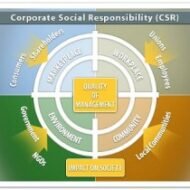Currently Browsing: CSR
Posted by Managementguru in Business Management, CSR, Entrepreneurship, Human Resource, Leadership, Strategy
on Dec 4th, 2014 | 0 comments

What it takes to be a Leader What is #Corporate Social Responsibility? High performance is generally measured against key business imperatives including #competitive advantage, #sales, #talent management, #operational efficiency, #return on investment and profitability. It is no longer adequate for a corporation to revel in economic prosperity in isolation from those agents impacted by its actions. Today, a new element of leadership is making an intense difference in weighing business performance: Corporate Social Responsibility. The late 1990s and the early 2000s saw an uptake in businesses giving proceeds or providing volunteers to causes related to their brands. Some called it “corporate social responsibility”; others called it “corporate #philanthropy” or “#corporate citizenship.” Regardless of its title, it was a way for business to increase visibility while raising funds for good. The spotlight is on both increasing the firm’s bottom line and being a good corporate citizen. Keeping abreast of global trends and remaining committed to financial obligations to deliver both private and public benefits have compelled organizations to restructure their frameworks, rules, and business models. Where does the roots of CSR lie? Although the #roots of CSR lie in altruistic activities (such as donations, charity, relief work, etc.) of corporations, globally, the concept of CSR has evolved and now embraces all allied concepts such as triple bottom line, corporate citizenship, philanthropy, #strategic philanthropy, #shared value, #corporate sustainability and business responsibility. You might be wondering what is “Triple bottom line?” (abbreviated as TBL or 3BL) – The term coined by John Elkington in 1994, incorporates the notion of sustainability into business decisions. The TBL is an #accounting framework with three dimensions: social, environmental (or ecological) and financial. “A plethora of research points to a majority of stakeholders agreeing that CSR is a ‘must do’,” and 67% of consumers say they are more likely to buy products and services from a company if they know it supported good causes. Smart Corporations: As a key component in business #strategy and execution, CSR is playing a crucial role in helping organizations to be seen as leaders. Smart corporations are allocating increasing internal resources to CSR investments that include clear objectives and furnish measurable social outcomes. India is a country of multitude contradictions. On the one hand, it has grown to be one of the major economies in the world, and an increasingly important player in the emerging global order, on the other hand, it is still home to the largest number of people living in absolute poverty (even if the proportion of poor people has decreased) and the largest number of malnourished children. This is the sad state of uneven distribution of the benefits of growth which many believe, is the root cause of social unrest. Companies too have been the target of those disconcerted by this lop-sided development and as a result, their contributions to society are under severe scrutiny. Many companies have been astute to sense this development, and have responded proactively while others have done so only when advocated. What it takes to be a Leader-2...

Posted by Managementguru in Business Ethics, Business Management, CSR, Economics, Organisational behaviour, Principles of Management
on Mar 15th, 2014 | 0 comments

CSR – An Image or Ethos A company’s sense of responsibility towards the community and environment in which it functions is known as corporate social responsibility.The object of social responsibilities of business has become the hot topic for discussion. Let’s not forget that really big companies are into the process of service benefiting economically backward population. It is widely accepted that accountability to owners is too narrow a concept for today’s business and that there is no reason why owner’s interests should take precedence over the interest of other claimants-employees, consumer community and the society at large. Responsibilies of Business Concerns: There is no definition of the concept of social responsibility which is valid for all business concerns and for all times. This is because responsibilities of business should be related to the changing societal expectations, which is dependent upon the social, cultural, political and other environmental forces, which are dynamic too. Business responsibility to the society goes beyond simply assuming the profit-making role. It implies that the management has to protect and improve the welfare of the society as a whole along with its own interest. What is the primary objective of a business? One common misunderstanding about the concept of social responsibility has to be clarified here. It does not challenge the primary objectives of business. It does not say that “to make profit is to sin.”Profiteering is different from profit making. Selfish interest is different from self-interest. Social responsibility is against profiteering and selfish business behavior. But profit making and self interest should be the basic elements of corporate responsibilities. Economic concerns and social concerns need not be viewed as opposite ends. They are complementary to each other. They are consistent with one another. Thus the nature and content of business responsibilities depend upon societal expectations placed on organizations which include invariably the economic performances and legal obligations, and go beyond them. How far it goes beyond depends on the economic, social and political environment in which the business and society operates. Arguments against social responsibility: The arguments against social responsibility are based on the belief that the society assigns a strictly economic role to the organizations and the concept dilutes the primary purpose of the business. Business should mind its business and business persons don’t have the right attitude to serve the society. Let it be the responsibility of government and social service organizations. Business has already enough economic and social power and no more concentration of power is necessary to business circles. Service to society is undoubtedly an important objective of business. It can render service to society by providing quality goods and services to the community; it can provide adequate opportunities to the members of the society; provide goods and services at reasonable price. Another important aspect would be to ensure control of pollution towards air, water and soil. Showing concern for the well -being of other constituencies of the society is a good gesture that helps the business to earn goodwill and support of the society as a...

Posted by Managementguru in Business Ethics, Business Management, CSR, Entrepreneurship, Principles of Management
on Mar 15th, 2014 | 0 comments
![Code of Ethics]()
Institutionalize Your Code of Ethics Business Ethics is a term we often come across in the world of corporate business. Ethics generally distinguishes between the right and the wrong. But you might argue, what is right for one person may not be for the other. “True! But there are certain principles that are widely accepted by everyone that guides the behavior of individuals or a business enterprise. Shall we say that Business Ethics is an UNWRITTEN CODE OF CONDUCT which governs the conduct of a business enterprise and also helps it in reaching the right decision? CSR CORPORATE SOCIAL RESPONSIBILITY comes into the big picture when you talk about business or professional ethics. When a person gears up himself to start a business, he studies the market as to how supportive it would be to carry on his business. He segments the market, evaluates the demography, approaches financial institutions like banks for loans, creates a big cacophony about the government’s red tapism to acquire licenses to do his business and when all these criteria accords a green signal he ventures into the market with a confidence that is backed up by all the above factors. Say by the end of the first year, he has done great business and the time has come for income tax or sales tax payments, a small voice cuckoos from within, asking him to think twice or to venture the possibilities of EVADING TAX. Once he tastes the essence of success and the POWER OF MONEY he deviates from the RIGHT CONDUCT and BEHAVIOR. He conveniently abstains himself from performing his duties towards customers, employees, government, share holders, stake holders and others. Mind you, being ethical is a statutory phenomenon and not a thing to be taken for granted. If your motivation and effort is oriented only TOWARDS PROFIT, thriving longer in the market will become a matter of concern. Every action has an equal and opposite reaction: “Whatever is that you take, you have to repay.”This is applicable both in personal life as well in business. Yogis’ have ascertained the fact time and again that you have to dissolve your karma or past actions to be a liberated soul. Neo world scientists also second this thought,” every action has an equal and opposite reaction. “Being ethical is not that demanding or tough as you have conceived it to be. In simpler terms, it even teaches you to be highly compassionate towards your fellowmen. Various aspects affecting ethical behavior in a business organization would be: Policies regarding moral duty and obligation Accounting ethics Corporate culture Ethics in management development programmes Dealing with “gray areas” Disciplinary procedures Review and updating the ethical code Increased concern about the well informed public Government regulations Value based management practices Enlightening the managers of top cadre Rewards and recognitions for people with right conduct and the list goes on and on. Corruptions, Bribery, Black marketing are some of the JARGONS that are strictly prohibited words and actions in the dictionary of ethics. Sound ethical practices not only create an IMAGE for your company, but also the recognition among your own employees that you could relish. Being ethical is not that difficult, only that it calls for undeterred determination and inbuilt...

Posted by Managementguru in Business Ethics, Business Management, CSR, Human Resource, Principles of Management
on Mar 12th, 2014 | 0 comments

What is the relationship between Corporate Social Responsibility and Business Ethics Business ethics can be defined as the principles and standards that establish acceptable conduct in business organizations. The acceptability of behaviour in business is determined by customers, competitors, government regulators, interest groups, and the public, as well as each individual’s personal moral principles and values. Can Ethics be Taught? I feel that ethics cannot be taught: it is an inbuilt entity and in countries like India where religion is all pervasive in business or any other discipline, this quality is imbibed in every individual right from his birth. The power of money and authority plays a major role in changing a man’s perspective and bureaucratic hurdles and red tapism mar the pace of business development. Businessmen should never compromise ethical principles with short-sighted objectives of amassing material wealth but should develop a spirit of altruism. Management education should focus also on training the individuals to be ethic-savvy apart from being mere decision making authorities satisfied with their designation and power of authority. Employees have the same kind of ethical responsibility towards their organisation and should not misuse time and property and should not place their interests before the enterprise objectives. What is Corporate Social Responsibility? Many consumers and social advocates reckon that businesses should not only make a profit but also consider the social implications of their activities. We define social responsibility as a business’s obligation to maximize its positive impact and minimize its negative impact on society. Although many people use the terms social responsibility and ethics interchangeably, they do not mean the same thing. Business ethics relates to an individual’s or a work group’s decisions that society evaluates as right or wrong, whereas social responsibility is a broader concept that concerns the impact of the entire business’s activities on society. There are good business reasons for a strong commitment to ethical values: 1. Ethical companies have been shown to be more profitable. 2. Making ethical choices results in lower stress for corporate managers and other employees. 3. Our reputation, good or bad, endures. 4. Ethical behaviour enhances leadership. 5. The alternative to voluntary ethical behaviour is demanding and costly regulation. Points to Ponder relating to behavioral ethics. 1. What conflicts of interest have you personally experienced in personal or professional roles? 2. If you perceive a potential conflict for yourself, what are some ways you might ensure that this conflict doesn’t lead to unethical behavior for you and others? 3. When have others’ conflicts of interest impacted how you or those you know were treated? 4. What types of policies can or do organizations implement to try to reduce conflicts of interest or their costs? 5. Why do you believe conflicts of interest are so pervasive in society? Why don’t we take more steps to avoid them? 6. Why is it so hard for individuals to recognize their own conflicts of interest, and how is this impacted by behavioral biases? Unethical behavior,conflicts,personal interests,responsibility What is Conflict of Interest? Conflict of interest arises when there is a clash between responsibility and reward. Say, if a doctor decides to be more business-like, if a judge decides to favor one party, if a ruling party favors a decision not good for the masses, what will happen? A conflict of interest exists when a person must choose whether to advance his or her own personal interests or those of others. Wal-Mart Stores, Inc., may have the toughest policy against conflict of interest in the retail industry. Sam Walton, the late founder of Wal-Mart, disallowed company buyers from accepting so much as a cup of coffee from suppliers. The Wal-Mart policy is black...

Posted by Managementguru in Business Management, CSR, Principles of Management
on Feb 26th, 2014 | 0 comments

According to Raymond Bauer, “Social responsibility is seriously considering the impact of the company’s actions on the society. It may also refer to the person’s obligation to evaluate in the decision making process, the effects of both his personal and institutional decisions and actions on the whole system, according to Keith Davis and Cobert Blomstorm. A) SOCIAL OBJECTIVES OF BUSINESS: 1. The focus should be on quality, safety, service and security which lead to customer satisfaction. Quality– Product superiority and durability Safety– Products should not cause any harm to the consumers Service– After sales service is the link that builds a long standing relationship between the company and customers Security– Sense of satisfaction and belief on the company’s brand 2. The business has social responsibility of giving adequate opportunities to the members of the society. If everybody aims at white collar job, how does a nation grow economically? Developing economies should promote and encourage entrepreneurs to create more “Job Opportunities.” This especially suits countries like India and China where the pressure of population is very high. 3. Mass production facilitates in factorizing the economy of scale and at the same time aids in providing with quality goods at reasonable prices to the consumers. We see big chain of retail shops like Cosco and Wal-Mart in the US have made this possible where consumers can avail discount for bulk purchase. In India, Big Bazaar is a forerunner in this kind of retail marketing which enhances the material well being of a community and raises the average standard of living of the people. 4. Another main objective of business would be to control the percentage of pollution in air, water and land. Discharge of effluent in a lake or a river by the industrial enterprise may result in water pollution and also affects the plant, animal life and fish and birds to a considerable extent. Stringent laws must be in place to avoid such incidences and protect the society. B) RESPONSIBILITY TO CONSUMERS There is only one valid definition of business purpose: “to create a customer”, the customer is the foundation of a business and keeps it in existence. The responsibilities of a business towards its customers would be: Increased productivity in order to make goods available for the consumers at the right time at right prices; this solely depends upon the increased efficiency of functioning of the businessConstantly strive to improve the quality of goodsR & D to improve product quality and to come out with better and new productsProper distribution structure to reach even the remotest of locationsRemove hoarding, black marketing, profiteering by middlemen or anti-social elementsProvide them with the required after sales serviceEnsure that the product supplied has no adverse effectSufficient information about the product has to be given to the consumers regarding the adverse effects and precautions to be taken while using the productNo misleading product information through improper advertisements or otherwiseTo provide an opportunity for being heard and to redress consumer grievances Consumer courts are becoming popular in India for handling consumer grievances swiftly and efficiently. It is but a sad thing that many people do not know that they can address issues relating to quality, quantity or service. The businesses should understand the consumer needs and take necessary measures to satisfy those needs. C) REPONSIBILITY TO THE COMMUNITY To prevent environmental pollution and to preserve the ecobalanceAssisting in the overall development of a localityUse alternate energy resourcesContributing to research and developmentRehabilitate the population displaced by the operation of the businessDevelopment of economically backward areasPromotion of small scale industriesContributing to the national effort It is gratifying to see that many leading corporate icons of...









